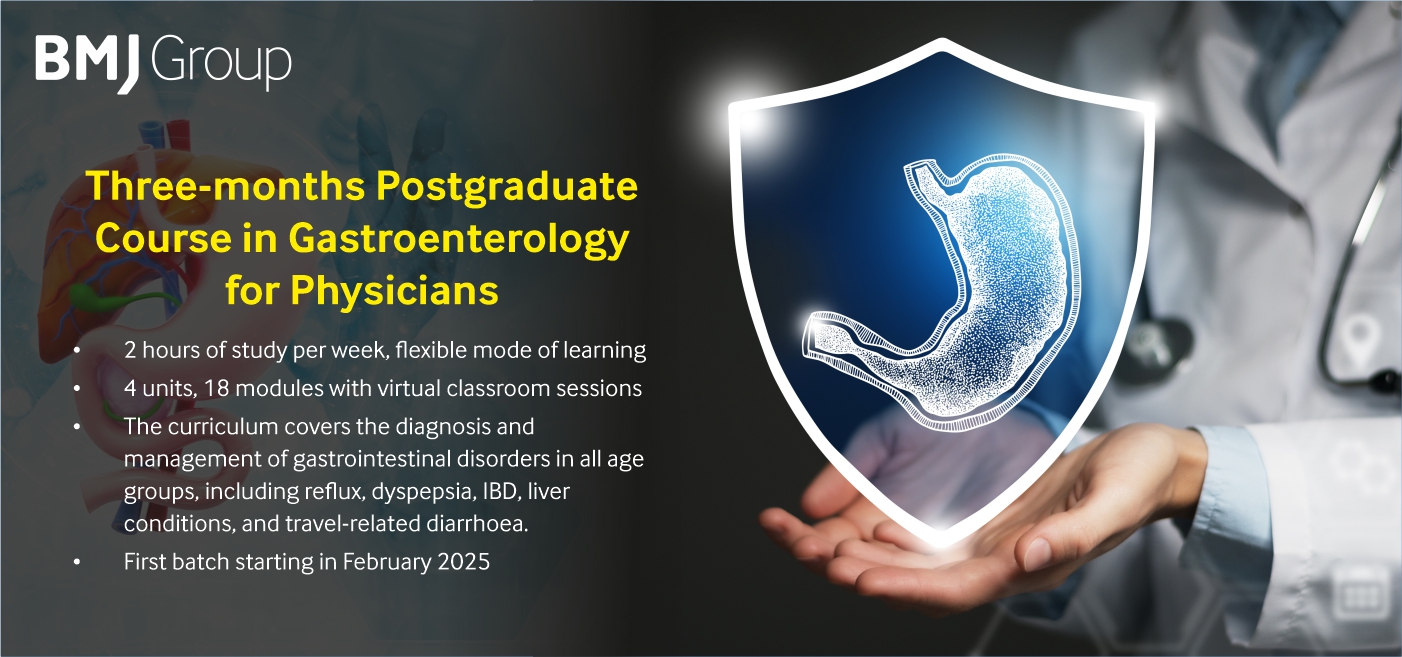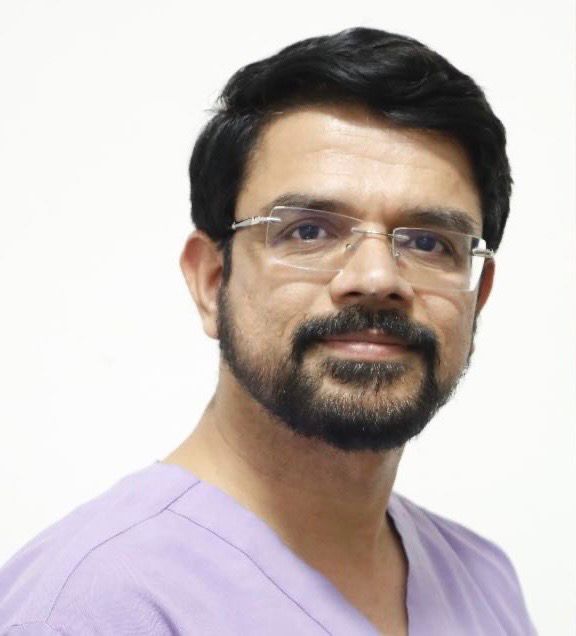
Curriculum
| Certification Course in Gastroenterology Practices for Primary Care Physicians (Only Online ) | Curriculum | |
| Certification Course in Gastroenterology Practices for Primary Care Physicians (with contact program) | Curriculum |
About this course
This online learning program is co-created by AIIMS Rishikesh, a tertiary academic centre in India, and BMJ India, to enhance the clinical competence of general physicians and consulting practitioners (CPs) in the diagnosis and management of gastrointestinal, hepatobiliary, and pancreatic diseases. The course is designed by leading experts addressing the unique demographics, disease patterns and challenges faced by practitioners in India. The program integrates evidence-based didactic teaching, case-based discussions, and a structured clinical observership in endoscopy and abdominal imaging modalities, thereby bridging the gap between primary care and specialist gastroenterology practice. While the focus of the course is on the assessment and treatment of acute and chronic conditions such as diarrhoea, dyspepsia, irritable bowel syndrome, and haemorrhoids, it also provides in-depth guidance on managing complex presentations like jaundice, swallowing difficulties, dyspepsia, and gastrointestinal bleeding. The curriculum covers specific conditions such as coeliac disease and the entire gamut of hepato-pancreatic-biliary disorders, offering a comprehensive overview of various GI disorders. Specific modules provide expertise in interpreting abdominal radiographs, investigating abnormal liver blood tests, and managing gastro-oesophageal reflux disease in both adults and children. The curriculum combines online modules with optional on-site observership exposure to diagnostic and therapeutic endoscopy, as well as abdominal ultrasonography (USG), CT, MRI, and transient elastography (FibroScan), emphasizing practical interpretation and clinical decision-making.Aims of the Program
- To strengthen the foundational and applied knowledge of gastrointestinal, liver, biliary, and pancreatic diseases among practicing physicians
- To improve early recognition, risk stratification, and appropriate referral of common and complex GI and liver disorders
- To provide structured exposure to endoscopic procedures and advanced imaging modalities relevant to gastroenterology practice
- To promote evidence-based, guideline-driven care in gastrointestinal and hepatobiliary diseases
- To foster collaboration between primary care physicians and tertiary care gastroenterology services
Why take this course?
Course Highlights- Trusted content - Co-created by the publisher of The BMJ, a globally renowned journal with a legacy since 1840 in delivering credible healthcare knowledge to professionals and AIIMS, Rishikesh, one of India’s premier healthcare institutes.
- Expert contributors - Authored and peer-reviewed by leading global subject matter experts and indigenised by experts in India specializing in gastroenterology.
- Comprehensive curriculum - Covers a wide spectrum of gastrointestinal conditions, common patient presentations, acute emergencies like GI bleeding and jaundice.
- Extensive hepato-pancreatico-biliary (HPB) coverage - Exhaustive coverage of various liver, gall bladder and pancreatic diseases, including ARLD, MASLD/NASH, pancreatitis, gall stone diseases, cirrhosis and hepatocellular carcinoma (HCC).
- Offers practical expertise - Specific modules enhance practical skills like abdominal radiograph interpretation, management of abnormal liver function tests, and understanding the ideal time to go for CT, MRI, fibro scan, and other imaging modalities.
- Preventive gastroenterology - Focused modules on lifestyle medicine, viral hepatitis prevention, pre/pro/synbiotics, and substance-related GI risks equip practitioners with future-ready skills.
- Engaging pedagogy -Features a mix of text-based learning, case-based discussions, engaging video sessions, and online assessments for an immersive learning experience.
- Certification - Earn a joint certificate of completion from BMJ and AIIMS Rishikesh by achieving a minimum passing score of 70%, showcasing your expertise in gastroenterology.
Course Structure
Program Modules: 34 modules
Text-based modules - 18
Video lectures - 16
Qualification for certificate
For successful completion of the course minimum passing percentage required is 70%
Eligibility criteria
Candidates must hold an MBBS degree from a recognized institute
Contact Us
For more information, please write to us at education.india@bmj.com or you can call us at 91-120-4345733, +919650052070 (09:30 AM - 05:00 PM, Monday to Friday).
Course Directors

Dr Rohit Gupta
Dr Rohit Gupta is a Professor of Gastroenterology at the All India Institute of Medical Sciences (AIIMS), Rishikesh, India, with over 15 years of experience in clinical practice, medical education, and research. He has authored approximately 70 peer-reviewed publications, including book chapters and papers in national and international journals.
He received his MBBS from Jawaharlal Nehru Medical College, Aligarh Muslim University, in 2002, followed by an MD in Internal Medicine in 2005 and a DM in Gastroenterology in 2008, both from the Postgraduate Institute of Medical Education and Research (PGIMER), Chandigarh.
His academic and clinical interests include liver diseases, particularly metabolic dysfunction associated steatotic liver disease (MASLD) and viral hepatitis, nutrition in gastrointestinal disorders, and the application of artificial intelligence in gastroenterology and hepatology.

Dr. Kieran Walsh
Clinical director - BMJ Learning and BMJ Best Practice, UK
Dr Kieran Walsh is the clinical lead of the medical education and clinical decision support products at BMJ. He has a vast amount of experience in online medical education, clinical decision support, face to face delivery of medical education, and both summative and formative assessment. He has published over 200 papers in biomedical literature and has written four books: the first and only book on cost effectiveness in medical education; a dictionary of quotations in medical education; a history of medical education in 100 images; and the Oxford Textbook of Medical Education. He is a Fellow of the Higher Education Academy, a Fellow of the Royal College of Physicians of Ireland, a Fellow of the Academy of Medical Educators, and Adjunct Associate Professor at Monash University. In the past he has worked as a hospital doctor specialising in General Internal Medicine and Geriatric Medicine.
Academic Moderator

Dr Ajeet Singh Bhadoria
Dr Ajeet Singh Bhadoria, is an Additional Professor in the Department of Community and Family Medicine at All India Institute of Medical Sciences, Rishikesh, India, and a visiting professor at the University of South Wales in the United Kingdom and Osh State University, Kyrgyzstan.
He is a public health expert specialized in the epidemiology of liver diseases, and he leads a Preventive Hepatology Clinic, providing comprehensive care for patients with viral hepatitis and various liver conditions (like steatotic liver diseases) and their families, promoting the importance of family screening in liver diseases.
Dr. Bhadoria has contributed to four WHO guidance documents as a member of the guideline development group (GDG) on viral hepatitis. His research, with over 150 publications in journals such as The Lancet and The Lancet Gastroenterology, focuses on improving viral hepatitis prevention and care, including HCV self-testing and HBV family screening. He has played a key role in advocating for India's National Viral Hepatitis Control Program (NVHCP) and subsequently in implementing it at the national and state levels
Contact Program Objectives
-
Clinical Knowledge
Understand the pathophysiology, clinical presentation, and management of common gastrointestinal, hepatobiliary, and pancreatic disorders.
Apply current national and international guidelines in routine clinical practice. -
Clinical Decision-Making
Improve case-based reasoning for diagnosis, management, and referral. Acquire practical skills in designing.
Identify red-flag symptoms and emergencies requiring urgent specialist care. -
Professional Development
Enhance confidence in managing GI and liver disorders at the primary and secondary care level.
Build long-term academic and clinical linkages with a tertiary gastroenterology centre. -
Endoscopy Exposure
Gain observational understanding of upper GI endoscopy, colonoscopy, and basic therapeutic procedures.
Recognize indications, contraindications, and complications of common endoscopic interventions. -
Imaging Interpretation
Develop practical skills in clinical interpretation of abdominal USG, CT, and MRI in GI and hepatobiliary disorder.
Correlate imaging findings with clinical scenarios and laboratory parameters .
